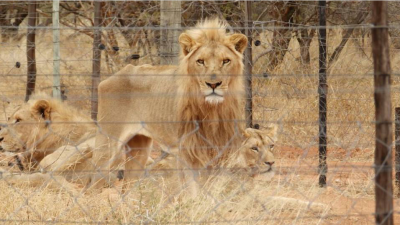News
Latest Lion Aid News
Skin and bones and ready for the bone and skin trade?
Wednesday 13th July 2016
|
It is becoming increasingly obvious that what we all campaigned for - a cessation of canned lion hunting - is now paying dividends.
Picture credit: Blood Lions.org
Tags: South Africa, Canned lion hunting Categories: Trophy Hunting, Extinction, Domesticating Animals |
Posted by Chris Macsween at 20:25
Carolyn Kiss
13th July 2016 at 23:22
Hi Christine,
Yes the reality is that the majority of the 8,000 lions in Canned Farms in S. Africa will not be saved. I would say about 100 will be saved. Most of them will starve to death and their bones and parts sold to China. I do NOT think the public in general understands this. I have sent an e-mail to Drew/ Paul - Captured in Africa/ Pippa - Blood Lions/ Sarah - CACH..asking if there is going to be something like a Central Intelligence Unit that will start working on a list of all the Big Cat Sanctuaries in Africa, and if any of them can take more cats, or if given money - expand. Then contact the NGO's - such as yourselves. IUCN - Big Cat Unit, Born Free, Four Paws INT, Panthera, WildAid etc to raise money to go toward this vaste and ongoing project. We know the S.African Gov. will not help with resources, but maybe they will help by allowing the release, or humane euthanisation of these animals. Regards Carolyn Kiss. P.S Thank you for helping with the Florida Bears..I was there protesting in Tampa.
Chris Macsween
11th August 2016 at 12:33
Hi Carolyn,
Thank you for your comment. The question of what to do with all these captive bred lions is one that few people want to actually address - most just want the problem to go away. When we spoke during a public screening of Blood Lions in the UK, the question inevitably came up. Both Ian Michler of Blood Lions and LionAid agreed that difficult decisions have to be made. The best immediate solution is that all captive breeding stops and that the breeders are allowed to run down their existing stock. Doubtless many of them will not see any profit in this and will offer trophy hunts at cut rate prices and attempt to sell skins and bones. There is little that the South African Government wants to do about this as they keep insisting that they have no influence over the breeders as these lions are not wildlife and not livestock - so they fall in a convenient grey area between two ministries.
In terms of dedicated action, in South Africa itself, we see little evidence of positive change and while there are very good intentions on the part of those seeking to prevent tourists and volunteers from visiting breeding facilities, the overall scope of the canned hunting industry is sadly increasing, e.g. in 2014 (latest data available) 1150 trophy lions were shipped out of South Africa, an increase of 20% over 2013. Most of these trophies (61% in 2014) go to the USA. We are uncertain as to whether the recent ESA listing of lions will affect such imports of captive bred animals. It should - as the USFWS is well aware that they cannot distinguish a wild trophy from a captive bred lion trophy. Perhaps you could find out from the USFWS whether they intend to apply the same stringent rules for wild lions to the South African trophy imports? We have always been of the opinion that the most effective steps that can be taken to shut down the South African lion breeding industry will come from abroad - by preventing imports of these canned trophies.
As for your suggestion of a broad consortium of organisations being effective to stop canned hunting, we are not sure that this in any way feasible. Some of the organisations you list are not troubled at all by wild lion trophy hunting and have stated that the captive breeding industry might take hunting pressure off wild lion populations e.g. the IUCN heavily supports the concept of captive breeding for commercial trade in for example snakes and crocodiles, vicunas, foxes etc.
As for money being raised to help the lions now in captivity, we know that this will not work as some people have already tried this (buying lions from the breeders and putting them in sanctuaries) but this only encourages the breeders to breed more lions. The breeders really don't care where their lions end up as long as they make money.
It is clearly a very difficult problem and any solution will be a difficult one and will not satisfy everybody in the conservation world. We have to accept the simple fact that there is no room anywhere for 8,000 captive bred lions to live out their natural lives.
Thank you for all you do. keep fighting the good fight.
Add a new comment
Existing user
New user sign up




